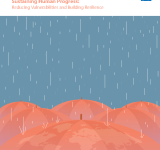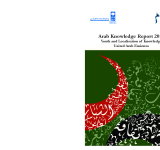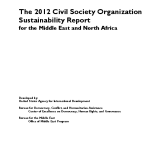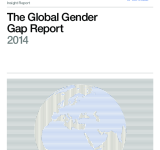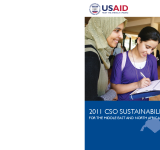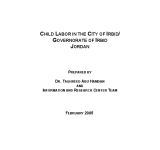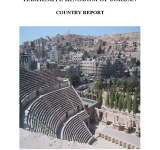environment
يسلط التقرير الضوء على واحدة من أهم القضايا أمام المجتمع الإماراتي، وهي مسألة إدماج الشباب وتمكينهم من المساهمة الفاعلة في نقل وتوطين المعرفة باعتبارها نقطة انطلاق لإقامة مجتمع المعرفة في الدولة،
يأتي هذا التقرير استمراراً لتراكم الجهود التي بدأت مع تقريري المعرفة الأول والثاني، ومواصلة تشخيص الإمكانات والآليات التي تمكن المنطقة العربية من تحقيق هدف بناء مجتمع المعرفة، والمشاركة في بناء
يمثل هذا التقرير مؤشر إستدامة منظمات المجتمع المدني السنوي لعام 212. حيث يركز على الأبعاد التالية: البيئة القانونية، القدرة المؤسسية، القدرة المالية، الدعوة وكسب التأييد، تقديم الخدمات، البنية التحتية
مؤشر الفجوة بين الجنسين العالمي والذي أسسه المنتدى الاقتصادي العالمي (دافوس) يخدم كإطار مخصص لادراك حجم التفاوت القائم بين الجنسين في العالم وامكانية متابعة تقدمهم. ابتداءً من سنة 26، يمثل تقرير عام
يعتمد هذا التقرير على الخبرة المحلية لتقييم المكونات الرئيسية لقطاع منظمات المجتمع المدني في مصر والعراق والأردن ولبنان والمغرب واليمن ، وكذلك في الضفة الغربية وغزة. يهدف تقرير استدامة منظمات المجتمع
This research study aims to investigate child labor in Irbid to provide a deep understanding of and knowledge about the socio-economic and cultural context of working children in Irbid. It also aims to propose intervention programs that maximize the effectiveness of the Family and Childhood Protection Society (FCPS);; an NGO in Irbid that works on issues related to children. Various study results have shown that children often work in dangerous and hazardous conditions where they are exposed to physical and psychological abuse;; in addition to exploitation in terms of minimal pay and long working hours. Both qualitative and quantitative methodologies were used to conduct the research presented in this report. In-depth interviews and questionnaires were used to collect data from all organizations working on child-related issues and from working children and their family members.
The report was published from the World Health Organization/ United Nations Children’s Fund (WHO/UNICEF)’s pilot project to test a method for the rapid assessment of the quality of drinking-water in six countries;; including Jordan;; China;; Ethiopia;; Nicaragua;; Nigeria and Tajikistan. This assessment report aims to develop a tool that would support WHO/UNICEF’s joint program in strengthening the monitoring efforts of the global access to safe drinking water. The analysis of the report is based on the water samples and statistical data that were collected from 1600 drinking water supply sites in 67 clusters. The report finds that drinking water quality is generally high in the distribution network of Jordan and national standards for bacteria complies with the WHO guideline values. It also identifies the sanitary risk factors for Jordanian water supplies including the presence of sewer lines;; old pipes and failure to properly maintain household storage tanks.
